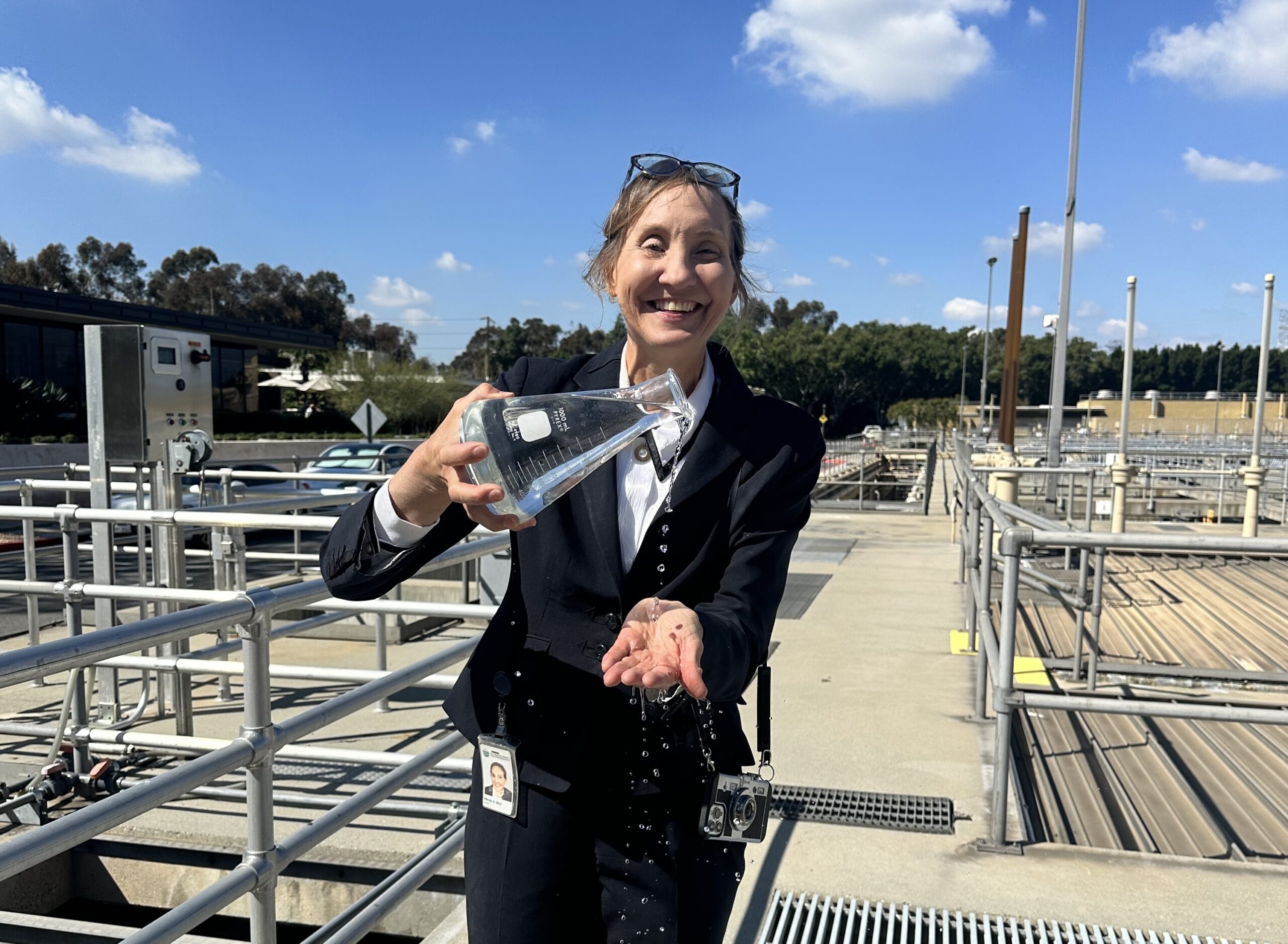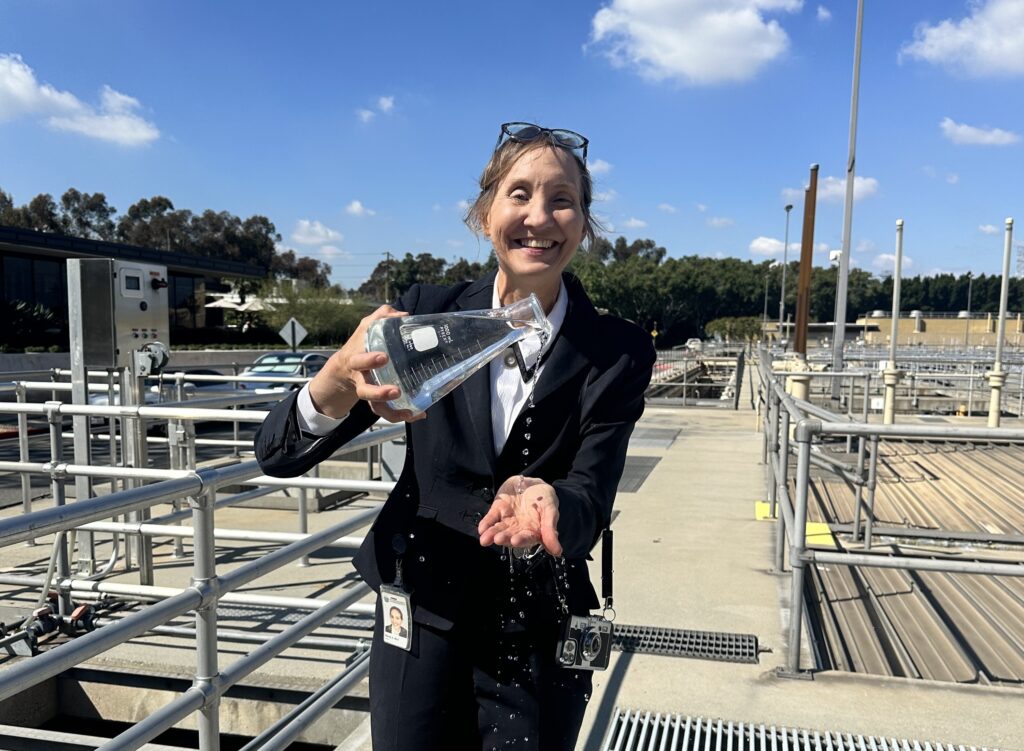The wastewater industry has historically been male dominant, and as of 2021, Data USA reported that females still only make up 5.75% of the workforce. From engineers to plant operators, there are a small but mighty group of women who play important roles across the industry.
We’re proud to have the opportunity to partner with Wendy Wert, Environmental Engineer for the Los Angeles County Sanitation Department (LACSD). Wert has been at LACDS for over 19 years. She also sits at the President of the American Academy of Environmental Engineers and Scientists. Join us as we discuss her passion for the industry, women in wastewater and our new partnership.
Tell us about what you do.
My studies gave me opportunities to teach and collaborate with others. It was during this time that I developed a passion for effectively communicating math and science to diverse groups. Today, I use my knowledge to support outreach and education programs that explain how the work of the Sanitation Districts identifies community needs, then applies engineering and scientific principles to help meet them.
How was being a female in the wastewater industry challenged you?
Our profession is incredibly challenging. As we work together to convert waste into resources there are starts and stops and numerous obstacles to overcome. The environmental issues of our era are so complex that we need experts with diverse backgrounds and skills to help solve them. So, if you take nothing else from this discussion know that no matter who you are or where you come from you have something valuable to contribute to this profession. Many of the best ideas that I have seen implemented have come from students, operators, and members of the public. Being open to contributions from others, leads to success.

How has this changed since you started your career?
Historical attributes of success were technical competency, efficiency, honesty, and fairness. We still need these skills, however, now we must support environmental professionals as we add.
The make-up of the staff has changed a lot since I entered the profession. There are many more women employees today, especially in operations and engineering. I have always felt that there are great opportunities in our field, regardless of gender, and am grateful for the ones I have had.
Who are the female icons you look up to in the industry?
I have been fortunate to have female role models and mentors throughout my career. As an undergraduate student, I was given the opportunity to complete a senior design project with the University of Central Florida Dean of Engineering, Debra Reinhart, Ph.D., P.E., BCEE. Debbie encouraged engagement in professional organizations as a resource for our senior design project. I joined the American Academy of Environmental Engineers and Scientists as a student member in 1997 and immediately realized the need for a network of peers to effectively meet the challenges of our complex field. We have remained colleagues and friends throughout my career.
When I came to California, I joined the Sanitation Districts because of our commitment to Public Service. I am proud to work in public service. At the Districts I met another role model Grace Robinson Hyde, P.E., BCEE, our first female Chief Engineer and General Manager. From watching Grace, I learned to lead through trust, respect, and fairness. Trust, because as professionals we depend on each other to accomplish our mission. Respect, because everyone deserves to be treated with respect. And fairness because everybody knows right? We may not like a decision that has been made, but if we know that it was entered into in an even-handed manner, we will accept it and move on.
Today, I am inspired by our Assistant Chief Engineer and Assistant General Manager, Martha Tremblay, who is committed to growing, connecting, and diversifying the environmental profession. She not only supports our outreach and education programs but also works tirelessly to do even more. Martha has a passion for welcoming children from the communities we serve into the profession. I am honored to serve alongside a leader who is collaborating with schools and community groups to help create pathways into our field!
Are there any young trailblazers you’re proud to see emerging in the industry?
Yes, I am excited to see so many brilliant people entering our field. We work so hard grow both the profession and professionals and I have had the privilege to work with many of them.
One of my colleagues, Warisa Niizawa, works tirelessly to help our agency achieve carbon neutrality. From Warisa, I have been inspired to never let anything stand in the way of our mission. She is brilliant, energetic, and kind. Warisa shares information and works not only toward operational excellence but also takes the time to recognize the contributions of every team member.

Another colleague, Belle Lynch is so dedicated to providing quality science education to all students that she converted an in-class laboratory into a virtual format so that we did not have to suspend our education programs during the pandemic. Belle also developed innovative outdoor workstations so that students could safely learn laboratory procedures. Belle works tirelessly to protect public health. She routinely conducts thousands of analyses, then shares her high-quality data to help keep all of us safe.

What is the most important part of your relationship with Responsible Flushing Alliance (RFA)?
The Sanitation Districts were created in 1923 to construct, operate, and maintain facilities that collect and treat domestic and industrial wastewater (sewage). Our team of engineers, scientists, technicians, and operators work around the clock to make sure that the community has constant service. Our, hope is that RFA influences positive behavior within the community that helps protect the regional wastewater collection system.
What are you looking forward to in working together with RFA?
What I am most looking forward to is the potential, through the Youth Cinema Project’s presence in Title 1 schools, to help create pathways to grow, connect, and diversify the environmental profession.
I have a great deal of faith in the personal investment we have all made in the environmental profession over our careers, because that level of commitment fosters resilience. Because of that resilience, despite the challenges we have had in recent years, I remain very optimistic for the future. The world has changed since I began working. Accordingly, the Sanitation Districts has changed, and will need to continue to change as well. But, I believe it is essential to never lose sight of our mission and the people we serve.

About Responsible Flushing Alliance
The Responsible Flushing Alliance (RFA) is a 501(c)(6) non-profit organization dedicated to consumer education focused on what not to flush. RFA’s goal is to change consumer behavior to help reduce damage to our nation’s sewage systems caused by objects and materials not designed to be flushed.
